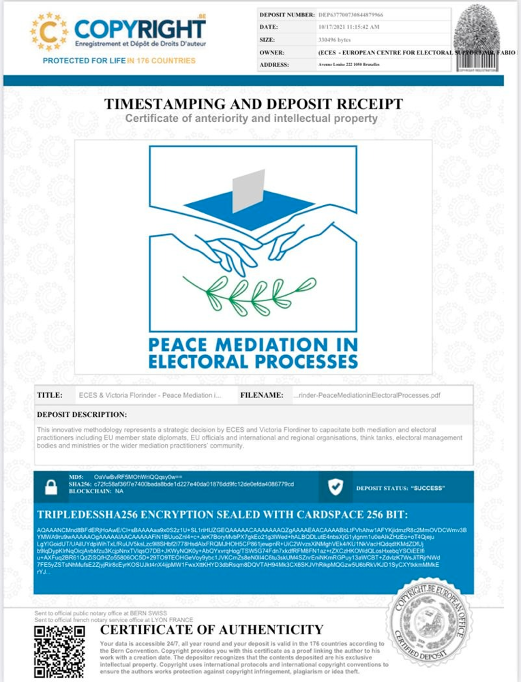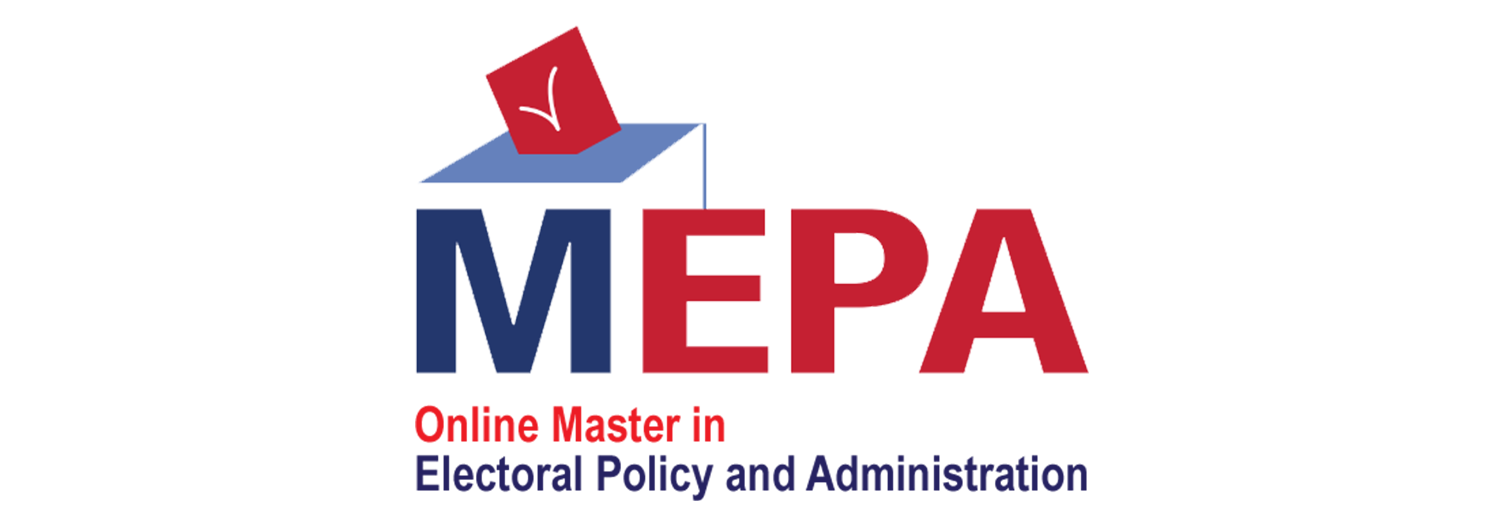ECES carry out its activities via innovative copyrighted methodologies and tools in relation to our advisory services, project and financial management. These are implemented following the quality management and financial transparency principles of the ISO 9001 and TRACE certifications that we have obtained and renewed every year.
In this context, we have started to copyright the concept of ECES per se as not for profit, independent, non partisan foundation established with the main purpose of facilitating the electoral cooperation between the EU, EU Member States and their partner countries when it comes to electoral assistance projects.
We have continued with our specific project approach called the “European Response to Electoral Cycle Support, EURECS” which in turn is implemented using 20 others copyrights among ICTs applications, tools and methodologies. In total, we do have at present 21 copyrights which are a testimony to the leading-edge work of ECES across the globe, and to our commitment to continuous improvement to further contribute to democratic and electoral processes worldwide. The list is following below as well as explanations for each of them:
- Concept of the European Centre for Electoral Support,
- European Response to Electoral Cycle EURECS,
- Leadership and Conflict Management Skills for Electoral Stakeholders (LEAD),
- Electoral Political Economy Analyses (EPEA) Methodology,
- Preventing election-related conflict and potential violence (PEV),
- Standard Operating Procedures (SOP),
- Communication and Visibility (C&V) Guidelines,
- Electoral Security Threat Assessment (ESTA),
- Leadership and Quality Management Skills for Electoral Administrators (LEAD-Q),
- Innov-Elections distance learning,
- Electoral Translator application,
- Roster Database for Electoral Assistance Experts,
- Peace Mediation for Electoral Processes methodology,
- Media Monitoring and Early Warning to tackle hate speech, mitigate conflict and gender-based violence strategy,
- Strategic Planning for Electoral Management Bodies,
- Polling Station Allocation System (GIS) application,
- Poll Workers Management System (PWMS) application,
- Electoral Results Aggregator (for EMBs and CSOs) application,
- Unified Social Media Monitoring and Early Warning System application
- Voter List Digitalisation System application.
- Global Election Management System (GEMS)
1. EURECS - A EUROPEAN RESPONSE TO ELECTORAL CYCLE SUPPORT
 ECES has crafted and copyrighted its strategy called "A European Response to Electoral Cycle Support - EURECS".
ECES has crafted and copyrighted its strategy called "A European Response to Electoral Cycle Support - EURECS".
EURECS is an innovative and alternative delivery mechanism to implement electoral and democracy assistance activities that are consistent with European values and EU policies and targets the implementation of the recommendations of EU election observation missions and it is built to help prevent, mitigate and manage electoral related conflicts. EURECS is implemented via specific methodologies and tools developed and also copyrighted by ECES such as its Standard Operating Procedures (SOP), the Communication & Visibility Guidelines, the Electoral Political Economy Analyses (EPEA), the project approach to contribute Preventing Electoral Conflicts (PEV), the cascade training curriculum called "Leadership and Conflict Management Skills for Electoral Stakeholders, LEAD", and its latest copyright, Leadership and Quality Management Skills for Electoral Stakeholders LEAD-Q.
2. LEADERSHIP AND CONFLICT MANAGEMENT SKILLS FOR ELECTORAL STAKEHOLDERS (LEAD)
 The Leadership and Conflict Management Skills for Electoral Stakeholders (LEAD) course was developed by Fabio Bargiacchi, co-founder and Executive Director of ECES. He created the concept with the Center for Creative Leadership (CCL) after attending CCL’s “Leadership Development Program” in San Diego in August 2009, while serving as Senior Electoral Assistance Advisor of the United Nations Development Program (UNDP) in Brussels and Coordinator of the Joint European Commission (EC)-UNDP Task Force on Electoral Assistance.
The Leadership and Conflict Management Skills for Electoral Stakeholders (LEAD) course was developed by Fabio Bargiacchi, co-founder and Executive Director of ECES. He created the concept with the Center for Creative Leadership (CCL) after attending CCL’s “Leadership Development Program” in San Diego in August 2009, while serving as Senior Electoral Assistance Advisor of the United Nations Development Program (UNDP) in Brussels and Coordinator of the Joint European Commission (EC)-UNDP Task Force on Electoral Assistance.
Building on his vast experience in the electoral assistance field, Fabio Bargiacchi identified the need for capacity-building training, and the added value this could provide in consolidating democratic transitions and ensuring free and transparent electoral processes.
The LEAD curriculum integrates both the concepts of leadership and conflict management, providing a solid foundation for capacity-building among the different stakeholders engaged in the electoral process. The curriculum was formulated after feedback was incorporated from several stakeholders, including representatives from the Electoral Commissions of the Economic Community of Central African States, Madagascar, Togo, Chad, Mali, along with participants of the Political Academy for Young Politicians (PYPA) and expert seminars organised by ECES and MediatEUr.
3. ELECTORAL POLITICAL ECONOMY ANALYSES METHODOLOGY (EPEA)
 The Electoral Political Economy Analyses (EPEA) Methodology, copyrighted by ECES, uses the political economy analysis (PAE) methodology, which studies the interaction of political and economic processes in society, distribution of power and wealth between different groups and individuals as well as processes that create, sustain and transform those relationships over time.
The Electoral Political Economy Analyses (EPEA) Methodology, copyrighted by ECES, uses the political economy analysis (PAE) methodology, which studies the interaction of political and economic processes in society, distribution of power and wealth between different groups and individuals as well as processes that create, sustain and transform those relationships over time.
The political economy analysis helps to understand what drives political behaviour, and how it shapes particular policies and programs, with a special focus on:
- The interests and incentives facing different groups in society and how these generate specific policy outcomes that may encourage or hinder development.
- The role that formal institutions and informal social, political, and cultural norms play in shaping human interaction and political and economic competition.
- The impact of values and ideas, including political ideologies, religion and cultural beliefs, on political behaviour and public policy.
The EPEA analysis recognises the complexity of electoral processes and the number of factors that influence it, which go beyond election administration, free and fair competition of candidates and observance of the right to vote. The role and impact of socioeconomic factors in electoral processes have been recognised in the research on electoral integrity and political stability.
4. PREVENTING ELECTION-RELATED CONFLICT AND POTENTIAL VIOLENCE (PEV)
 This methodology was developed and copyrighted by ECES as a unique two-pronged approach to prevent and manage election-related conflict and violence.
This methodology was developed and copyrighted by ECES as a unique two-pronged approach to prevent and manage election-related conflict and violence.
The PEV approach forms part of ECES's already copyright protected strategy “European Response to Electoral Cycle Support (EURECS)".
The PEV approach is the broader framework of a number of activities, also copyright protected by ECES namely the training curriculum Leadership and Conflict Management for Electoral Stakeholders (LEAD) methodology and the research methodology, Electoral Political Economy Analysis (EPEA).
5. IMPLEMENTING EURECS - STANDARD OPERATING PROCEDURE (SOP)
 Copyrighted by ECES, the integrated Standard Operating Procedures (SOP) are used to implement ECES Quality Management System (QMS) and the EURECS strategy. The SOP encompass a practical implementation approach to electoral cycle support, informed by past experiences from ECES dating back to 2010.
Copyrighted by ECES, the integrated Standard Operating Procedures (SOP) are used to implement ECES Quality Management System (QMS) and the EURECS strategy. The SOP encompass a practical implementation approach to electoral cycle support, informed by past experiences from ECES dating back to 2010.
The SOP builds on the electoral cycle approach on the recommendations of EU Observation Missions (EUOM) and indications of EU Services and Institutions in Brussels.
The ECES SOP is an integrated document that supports the Quality Manual (ECES-M-01) by providing detailed step-by-step guidance regarding the implementation of each process of the QMS required for the implementation of EURECS. It provides an ample description of processes and procedures that must be followed in order to implement the QMS and EURECS in line with ISO 9001:2015 and international standards and regulations of sound project cycle management using donor funds.
The structure of this document follows a number of identified processes, grouped and ordered under management, key operational and support. This document, particularly with reference to the key operational processes, has been designed along the lines of the project cycle, forming part of relevant reading for ECES experts, donors, evaluators and auditors and providing practical guidance to all ECES experts that will implement activities fully in line with the SOP.
Besides providing guidance on these practical steps, the SOP also includes references to all the templates and forms necessary to comply with the relevant procedures in the annex.
6. COMMUNICATION AND VISIBILITY GUIDELINES
 A unique copyright of ECES, the “ECES Communication and Visibility (C&V) Guidelines” is the final product of a lengthy and wide ranging consultation across our foundation, completed by colleagues with long and varied experience in all aspects of communications.
A unique copyright of ECES, the “ECES Communication and Visibility (C&V) Guidelines” is the final product of a lengthy and wide ranging consultation across our foundation, completed by colleagues with long and varied experience in all aspects of communications.
Visibility is a bedrock element of most policies the European Union and EU Member States, which are our main donors, agree on and contracts to organisations like ECES to implement.
ECES C&V Guidelines are drafted for our personnel but also to be shared with our donors, beneficiaries of our projects and other electoral stakeholders to indicate the importance ECES attach to this issue also to fully respect contractual conditions with our donors.
These guidelines offer a 360-degree picture of the current landscape. They cover everything from audience understanding to social media analytics, taking better pictures to writing better words, banner design to logo design, and copyright to search engine optimisation. And much, much more.
7. ELECTORAL SECURITY THREAT ASSESSMENT (ESTA)
 Copyrighted by ECES, the Electoral Security Threat Assessment (ESTA) is a specific methodology which is an integral part of the European Response to Electoral Cycle Support (EURECS) strategy.
Copyrighted by ECES, the Electoral Security Threat Assessment (ESTA) is a specific methodology which is an integral part of the European Response to Electoral Cycle Support (EURECS) strategy.
It is a project's stakeholder mapping activity with the potential to monitor lurking localised conflicts or external threats from border areas and more around the electoral and political scenario of a given country.
The ESTA is a constant security mapping that seeks to engage on non-committal terms with the “supply side” of the security sector, including various institutional actors.
8. LEADERSHIP AND QUALITY MANAGEMENT SKILLS FOR ELECTORAL ADMINISTRATORS (LEAD-Q)
 The “Leadership and Quality Management Skills for Electoral Administrators” is a capacity development methodology (LEAD-Q)" which is the result of lessons learnt over the last 10 years of ECES in assisting electoral administrators.
The “Leadership and Quality Management Skills for Electoral Administrators” is a capacity development methodology (LEAD-Q)" which is the result of lessons learnt over the last 10 years of ECES in assisting electoral administrators.
The LEAD-Q is developed from the already ECES copyrighted training methodology, namely the LEAD (Leadership and Conflict Management Skills for Electoral Stakeholders).
LEAD-Q is original because it prescribes a set of rules, routines and procedures developed to address common weaknesses within electoral administrations targeting quality management in their electoral processes. If these rules, routines and procedures are applied, it will inevitably lead to greater internal effective performance more, increased transparency.
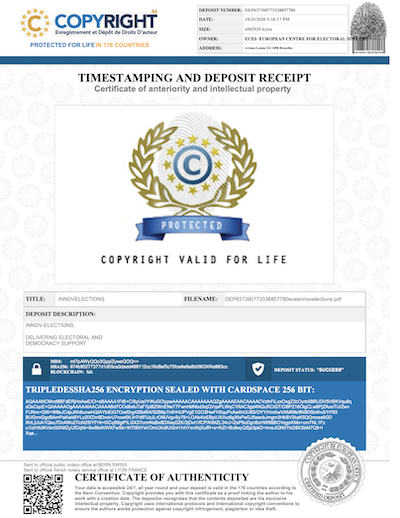 In May 2020, in light of the global coronavirus pandemic, ECES launched and copyrighted INNOV-ELECTIONS, a hybrid approach to training delivery based on the comparative experience of ECES experts and partners in the field, further enhancing the contextualisation of the training programmes to the local realities.
In May 2020, in light of the global coronavirus pandemic, ECES launched and copyrighted INNOV-ELECTIONS, a hybrid approach to training delivery based on the comparative experience of ECES experts and partners in the field, further enhancing the contextualisation of the training programmes to the local realities.
INNOV-ELECTIONS is built around the following three main areas:
1. Optimise the COVID-19 confinement by enhancing the potential of electoral stakeholders;
2. Enhance young and women’s roles and participation in the management of elections;
3. Enhance electoral stakeholders’ leadership, conflict and quality management capacities.
It provides an effective response to the challenges brought by the pandemic through three main tools:
1. Live webinars and WebEx classes delivered remotely on every steps of the electoral cycle as per the subject mentioned above;
2. ECES copyrighted trainings on Leadership and Conflict Management for Electoral Stakeholders (LEAD) and on Leadership and Quality Management for Electoral Stakeholders (LEAD-Q); and
3. Through a partnership with the Sant'Anna School of Advanced Studies (SSSA), the Online Master in Election and Public Administration (MEPA) or some of its individual 19 modules
These tools are supplemented by close contextualised online capacitation to the beneficiaries to ensure the maximum possible benefit within the beneficiaries’ different contexts.
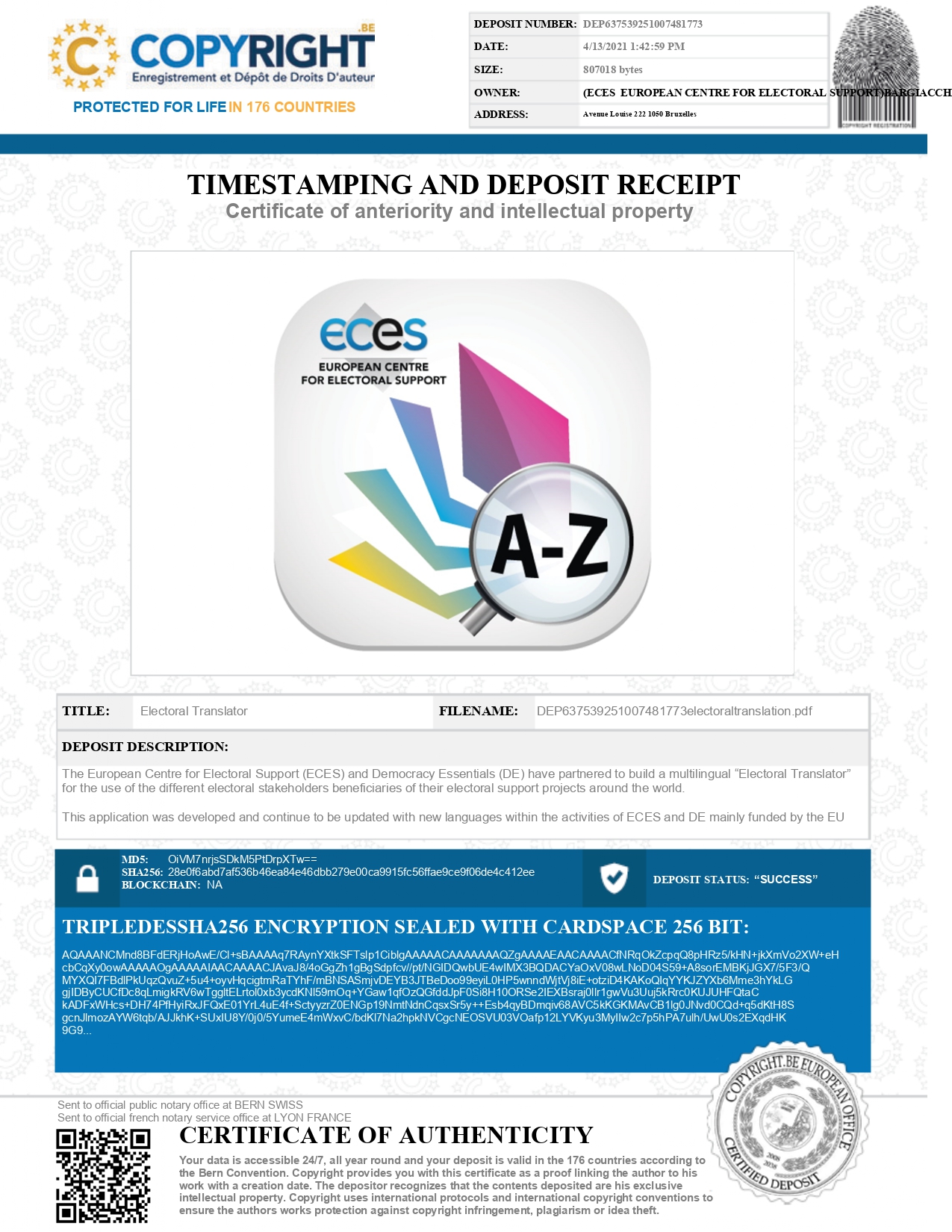 In April 2021 ECES launched and copyrighted the application “Electoral Translator”. This is a tool that translates electoral terms in English, French, Portuguese, Italian, Spanish and Arabic. The six Ethiopian official languages (Amharic, English, Afar, Oromo, Somali and Tigrinya) will also be included.
In April 2021 ECES launched and copyrighted the application “Electoral Translator”. This is a tool that translates electoral terms in English, French, Portuguese, Italian, Spanish and Arabic. The six Ethiopian official languages (Amharic, English, Afar, Oromo, Somali and Tigrinya) will also be included.
The general aim is to provide the international audience with the opportunity to understand and master the very specific language used in the field of democracy and elections, within the broader objective of making electoral processes around the world more inclusive and sustainable.
This application, which translates electoral terms in different languages, has been developed by ECES with its technical partner of Democracy Essentials for the use of the different electoral stakeholders, which are beneficiaries of their electoral support projects around the world.
The Electoral Translator serves all electoral stakeholders. including: electoral management bodies, competing political parties and candidates, media and journalists, civil society organisations dealing with election observation and voter education, security forces and institutions dealing with electoral dispute resolutions.
 In September 2021, ECES has copyrighted its own database: The Roster Database for Electoral Assistance Experts.
In September 2021, ECES has copyrighted its own database: The Roster Database for Electoral Assistance Experts.
The Roster and the related application were established taking into account the accumulation of 25 years of knowledge, experience and professional networks of the ECES’ founder in different institutions and international organisations implementing electoral assistance and election observation (EU, UN, OSCE) coupled with the 11 years of experience in the promotion electoral and democratic strengthening of ECES.
It includes 1500 specialized CVs of Project Directors, Project Coordinators, Finance and Operations Managers, Accountants, Procurement experts for the management of EU/EU member states funded projects and area experts specialised in all steps of an electoral process such as: electoral leadership; legal framework; electoral operations; prevention of electoral conflicts; media monitoring; institutional communication; electoral budgeting; voter registration; delimitation of boundaries; face to face and distance capacity
One of the most important added value is ECES' capacity to rapidly mobilise highly qualified expertise through its Roster’s app. The procedure for the mobilisation of expertise is mostly based on the consultation of this app, exchanges with donors and beneficiaries and the establishment of a Human Resource Plan particularized for each project, that is submitted for approval before the start of the activities.
12. PEACE MEDIATION IN ELECTORAL PROCESSES METHODOLOGY
ECES has co-developed a methodology on “Peace Mediation for Electoral Processes” which is the first practical contribution to guide mediation and electoral support actors on opportunities and risks to support-, fund-, or conduct peace mediation in electoral processes.
The methodology is based on concrete cases of peace mediation in electoral processes to draw lessons of common risks and windows of opportunities for conflict settlement around the electoral cycle. It thereby fills an important gap by offering concrete guidance when attempting to mediate – or support peace mediation efforts in electoral processes or crises that arise or escalate due to flawed elections.
The methodology unpacks peace mediation opportunities and risks in electoral processes in unprecedented detail. It uses the electoral cycle, and each of its phases; common electoral systems and legal frameworks to look at potential entry points – and challenges to avoid for peace mediation efforts. The methodology also looks at the electoral and mediation vocabulary and suggest ways to render the language of electoral and mediation actors more conflict sensitive.
Our methodology can be structured as a training curriculum and offered as personal coaching or to a larger group. The Peace mediation in Electoral Processes methodology is a lens that can be applied to any context in order to offer more concrete and practical guidance to see – and cease opportunities for timely conflict settlement – and stay clear of common pitfalls within both mediation and electoral support. As such, the methodology is well suited to complement conflict analysis.
13. MEDIA MONITORING AND EARLY WARNING TO TACKLE HATE SPEECH, MITIGATE CONFLICT AND GENDER BASED VIOLENCE
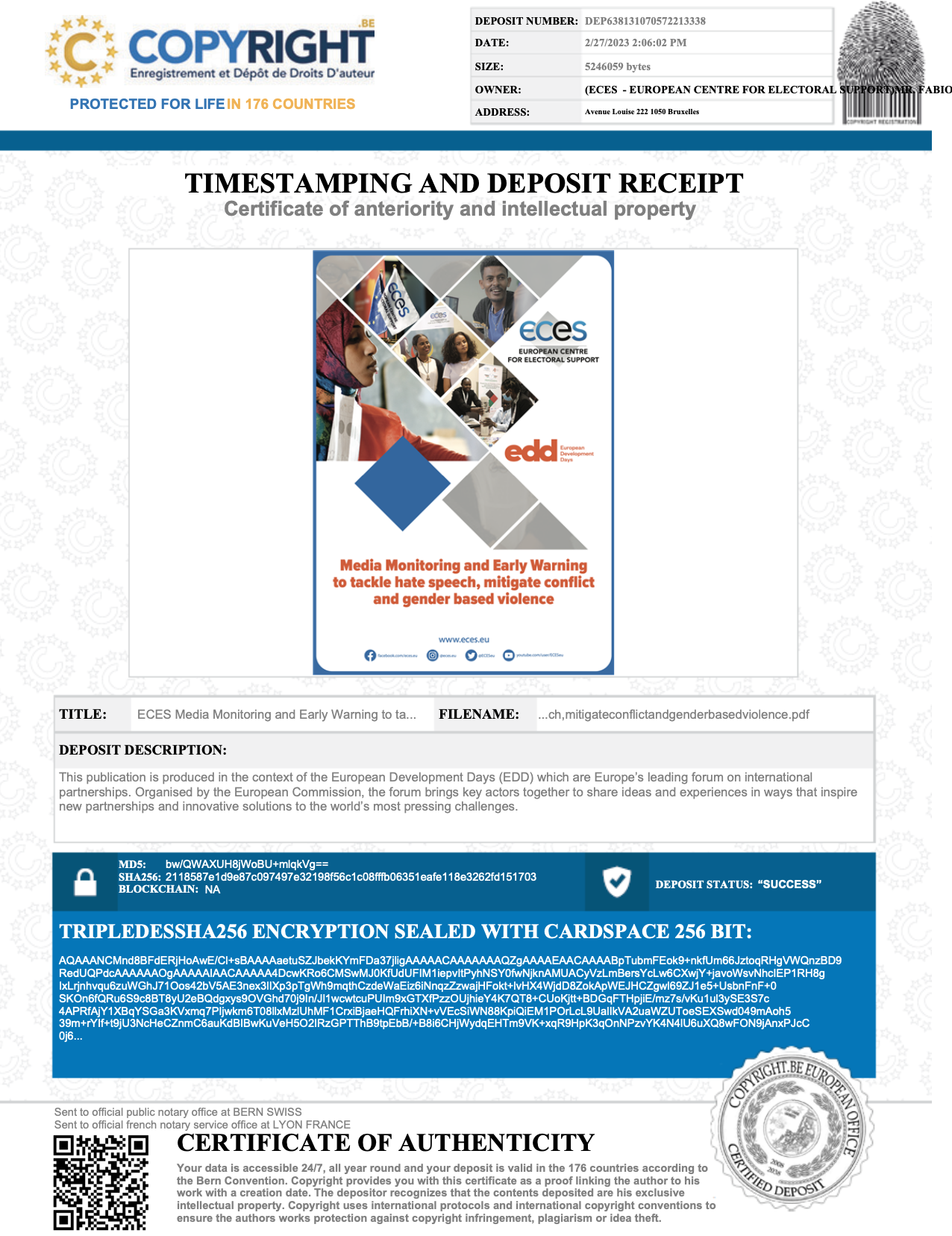
During the European Development Days 2022, ECES has presented the ‘Media Monitoring and Early Warning to tackle hate speech, mitigate conflict and gender-based violence’ which is the result of ECES’s experience accumulated over the last 12 years in preventing and mitigating electoral violence.
Given the key influence exercised by the media over voter’s preferences and perceptions, ECES has developed and copyrighted the ‘Media Monitoring and Early Warning to tackle hate speech, mitigate conflict and gender-based violence’ strategy.
It is built on the following three pillars:
- Voters’ rights to receive information
- Candidates’ rights to impart information
- The media’s right to freedom of expression
It is implemented through two central tools: the Monitoring of Hate speech in mainstream and social media, and the Early Warning and Early Response systems in the electoral context.
Its mixed approach, considering both the qualitative and quantitative aspects of media monitoring, provides ECES’s partners with a comprehensive approach to identify, monitor and prevent hate-speech, discriminatory practices and gender-based violence on the media, favoring effective remedial measures.
14. STRATEGIC PLANNING FOR ELECTORAL MANAGEMENT BODY USING QUALITY MANAGEMENT PRINCIPLES
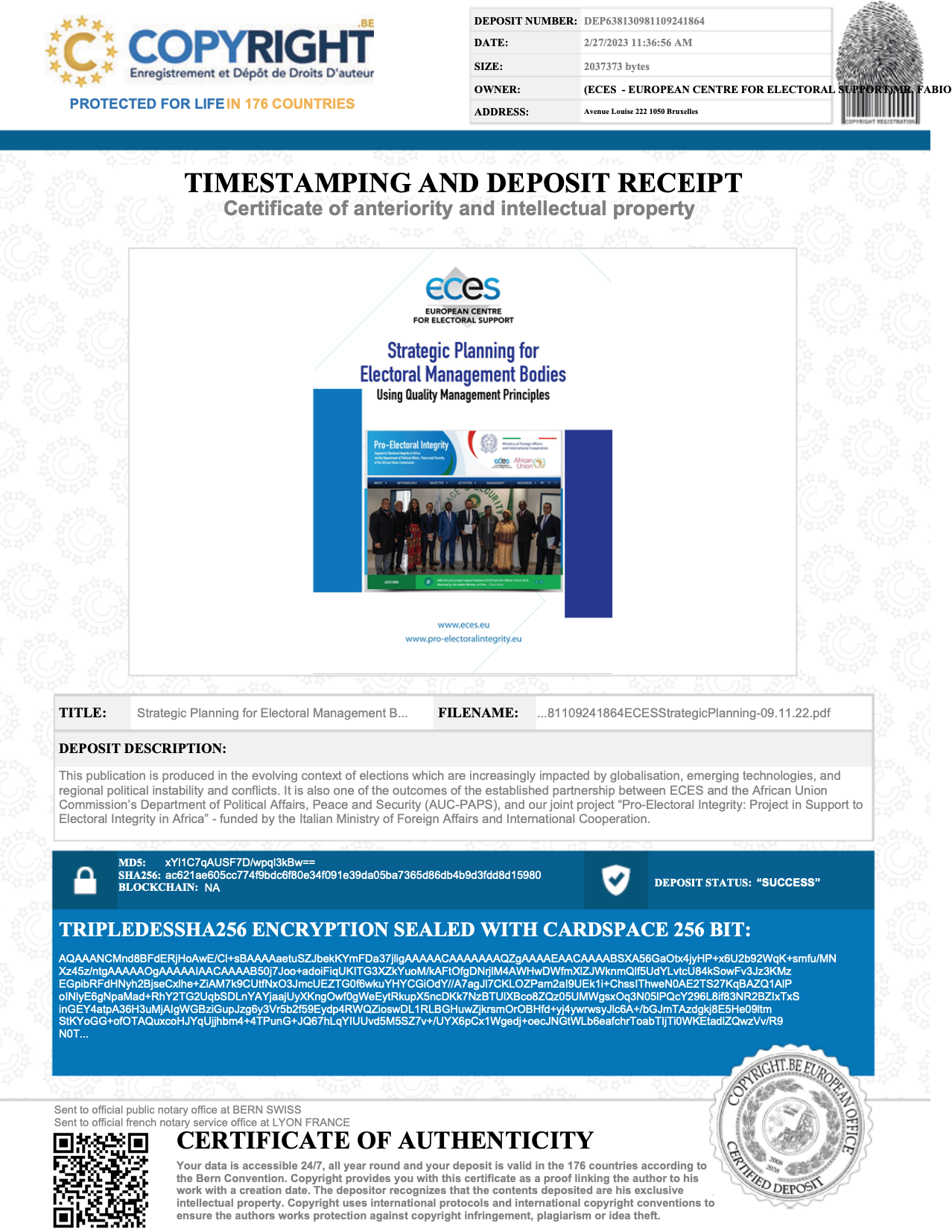 On occasion of the 7th Annual Continent Forum of Election Management Bodies (EMBs) on 14-15 November 2022 in Maputo Mozambique, ECES has presented the ‘Strategic Planning for Electoral Management Bodies’ which is the ECES’s response to the evolving context of elections which are continuously influenced by new technologies, political instability, potential conflicts and globalization. It is the result of lessons learnt over the last 12 years of ECES in assisting electoral administration in various parts of the world to strengthen internal efficiency according to their electoral and legal frameworks.
On occasion of the 7th Annual Continent Forum of Election Management Bodies (EMBs) on 14-15 November 2022 in Maputo Mozambique, ECES has presented the ‘Strategic Planning for Electoral Management Bodies’ which is the ECES’s response to the evolving context of elections which are continuously influenced by new technologies, political instability, potential conflicts and globalization. It is the result of lessons learnt over the last 12 years of ECES in assisting electoral administration in various parts of the world to strengthen internal efficiency according to their electoral and legal frameworks.
Strategic planning aims at reinforcing the resilience of EMBs, allowing them to overcome potential treats arising from changing contexts. It will give the opportunity to EMBs to program upcoming elections and to build the necessary structures they need to manage and conduct upcoming elections.
Being aware of the differences contradistinguishing each EMB and electoral environment, there are common features in the elaboration of a strategic plan that shall be considered for all EMBs and electoral contexts.
In this light, the ‘Strategic Planning for Electoral Management Bodies’ is meant to provide EMBs with a practical guide on how to facilitate stakeholders’ participation in electoral processes, fostering citizens’ trust, favoring the spread of best practices like quality management principles, while tackling related risks.
Thus, this comprehensive strategy will give EMBs the opportunity to place themselves as a reliable, transparent and efficient bodies in the electoral processes.
15. POLLING STATION ALLOCATION SYSTEM VIA GEOGRAPHIC INFORMATION SYSTEM (GIS)
 The Polling Station Allocation System (GIS) application is tailor to the need of the different countries we are working with, mainly in Africa and the Middle East.
The Polling Station Allocation System (GIS) application is tailor to the need of the different countries we are working with, mainly in Africa and the Middle East.
This application utilises Geographic Information System (GIS) technology to map the locations of polling stations in a country. This tool is designed to facilitate logistical and operational planning for electoral events, thereby enhancing the traceability and transparency of the electoral process.
One of the main benefits of this system is its ability to provide data visualisation at voting centres and stations, which allows for a better understanding of the electoral process. By considering geographical factors and the distance to urban centres, the system enables better distribution of voting centres across the country.
The system records the exact location of all polling stations and provides key information such as road networks, distances from police stations, number of registered voters, distances between polling stations, nearest electoral office, access to people with disabilities, overnight storage facilities, and previous security and fraud incidents. Its database can be used to optimise the allocation of resources, reduce the risk of electoral fraud, and improve security measures. The system is an essential tool for electoral commissions and other organisations involved in managing electoral events.
The information of each polling station is imported in the system together with the logistical information of the station. The position and general information are than shown in the map of the system. The information include: the type of building where the polling station is located (school, hospital, police station, government office, among others), region, constituency, and number of register voters.
16. POLL WORKERS MANAGEMENT SYSTEM (PWMS)
The Poll Workers Management System (PWMS) is an efficient and reliable system for managing poll worker profiles. This exercise is crucial to ensure that the electoral process runs smoothly without disruptions. This system encompasses various verification stages, starting from the initial submission of applications by potential poll workers to their deployment on election day and beyond. The system enables electoral commissions to keep track of poll workers' expertise, education, years of experience, and languages spoken, thus ensuring that they are assigned to suitable positions that match their skills and competencies. It includes the feature of secure uploading and storing of necessary documents, such as identification cards, educational degrees, and certificates, to their profiles, for electoral officials to verify their qualifications. The system also includes features for verifying poll worker payments and generating end-of-work certificates to compensate them for their service. By streamlining the process of managing poll worker profiles, the system helps electoral commissions to optimise their resources and ensure that they have a sufficient number of trained personnel to operate polling stations on election day. This system plays a vital role in ensuring the smooth functioning of the electoral process and contribute to the credibility and legitimacy of electoral outcomes.
17. ELECTORAL RESULTS AGGREGATOR FOR EMBs AND CSOs
 The Electoral Results Aggregator (for EMBs and CSOs) system comprises various components that work together to process and provide real-time updates of election results. The scheduler engine is responsible for initiating three communication channels that help in result processing, including a call to the electoral commission for result directory download, a call to the backend engine for polling station results form data extraction, and a call to the backend engine for tally centre results form data extraction. The Results File Downloader provides the functionality to download, decompress result files from the electoral commission APIs, and persist relevant data to the database. The system's front-end web application is built in Angular 9 and comprises various features, including a dashboard showing total votes per candidate and percentage of total votes, web pages for entering and verifying PS and PC data, a login page, a mechanism to edit wrongly keyed-in data, and a webpage to compare PS and PC data on the constituency level. The system is designed with optimal performance in low-bandwidth locations, user-friendly interface, integrated with backend for real-time updates, and secured with endpoints to ensure authorized access to the services.
The Electoral Results Aggregator (for EMBs and CSOs) system comprises various components that work together to process and provide real-time updates of election results. The scheduler engine is responsible for initiating three communication channels that help in result processing, including a call to the electoral commission for result directory download, a call to the backend engine for polling station results form data extraction, and a call to the backend engine for tally centre results form data extraction. The Results File Downloader provides the functionality to download, decompress result files from the electoral commission APIs, and persist relevant data to the database. The system's front-end web application is built in Angular 9 and comprises various features, including a dashboard showing total votes per candidate and percentage of total votes, web pages for entering and verifying PS and PC data, a login page, a mechanism to edit wrongly keyed-in data, and a webpage to compare PS and PC data on the constituency level. The system is designed with optimal performance in low-bandwidth locations, user-friendly interface, integrated with backend for real-time updates, and secured with endpoints to ensure authorized access to the services.
18. THE UNIFIED SOCIAL MEDIA AND EARLY WARNING SYSTEM
The Unified Social Media Monitoring and Early Warning System application is a comprehensive and efficient tool that provides an early warning and monitoring mechanism for incidents of violence and hate speech. This system records incidents from social media streams and from the field, providing necessary resources and skills to institutions and monitors on the ground. The system is designed to ensure sustainability, helping to create a peaceful environment and prevent conflicts. It serves as a database and repository for all information gathered and actions taken, thus allowing for historical tracking and analysis. The main dashboard of the system provides real-time updates on incident locations, using charts and maps to identify potential hotspots that require follow-up. The system also triggers alerts and notifies managers to ensure prompt action. This system is an all-in-one solution that helps institutions prevent and mitigate conflicts.
19. VOTER LIST DIGITALIZATION SYSTEM
The Voter List Digitalisation System application supports the essential process of digitalisation of voter lists that involves converting voter registration information from paper format to a digital database system. This process enables electoral commissions and other stakeholders to easily manage voter data, reduce the risk of errors, and enhance the transparency of the electoral process. The voter list digitalisation system is built with customisable features in order to meet the specifications of any paper-based voter registration process and includes tools for data validation, cleaning, and integration with other electoral databases. By digitising voter lists, electoral commissions can efficiently manage voter data, identify and prevent fraudulent practices, and ensure that only eligible voters participate in the electoral process. This system ultimately provides greater transparency and accountability, which are fundamental elements for a free, fair, and credible electoral process. office, among others), region, constituency, and number of register voters.
20. GLOBAL ELECTION MANAGEMENT SYSTEM (GEMS)
 The Global Election Management System (GEMS) assists in achieving the ultimate goal of making informed decisions in electoral management. This platform, devellopped with Democracy Essentials, focuses on three key areas: thorough planning, effective risk management, and efficient communication with field personnel. It integrates various applications to organise and analyse data, providing visual dashboards for real-time insights.
The Global Election Management System (GEMS) assists in achieving the ultimate goal of making informed decisions in electoral management. This platform, devellopped with Democracy Essentials, focuses on three key areas: thorough planning, effective risk management, and efficient communication with field personnel. It integrates various applications to organise and analyse data, providing visual dashboards for real-time insights.
The platform includes:
GEMS Dashboard
The Dashboard module empowers EMB users to create sophisticated visual representations and engage with dynamic maps, thereby elevating their data analysis and decision-making capabilities.
Warehouse Management System (WMS)
WMS is a comprehensive web-based application designed to streamline the oversight of warehouse activities, making it easier for election officials to manage and monitor election equipment and supplies.
GEMS RFID
Radio frequency identification (RFID) technology offers a substantial enhancement in the identification and tracking of electoral packages stored in the warehouse. It facilitates effective inventory control and continuous monitoring of their movements. When integrated with our GMS system, it guarantees comprehensive tracking of all election packages, ensuring an elevated level of transparency and accountability throughout the entire process, from the warehouse to their ultimate destinations.
Geo Location Management System (GMS)
We employ GPS technology to ensure the punctual and precise transportation of materials from the warehouse to their assigned destinations. Through our GPS management system, the seamless integration of tracking confidential electoral packages, overseeing the transit procedure, and effectively handling logistics communication during transportation is designed to ensure the smooth execution of your election process.
GEMS Helpdesk
The effectiveness of assistance offered during Election Day hold significant importance. It is imperative for support personnel to efficiently provide solutions. GEMS Helpdesk streamlines this procedure by serving as a centralised web application that instantly records, classifies, prioritises, and monitors incidents throughout the entire electoral process.
GEMS Files
Discover the benefits of GEMS Files, an exceptionally secure document management platform hosted in the cloud, expertly customized to address the specific file-sharing needs of electoral processes. Safeguard, arrange, oversee, exchange, and retrieve files in various formats instantly, using any device, to ensure effortless cooperation and ease of use.
Poll Workers Management System (PWMS)
This module streamlines the task of generating staff assignments, enabling users to boost their productivity in staff allocation, optimize schedules, effortlessly distribute documents, and assign shifts.
